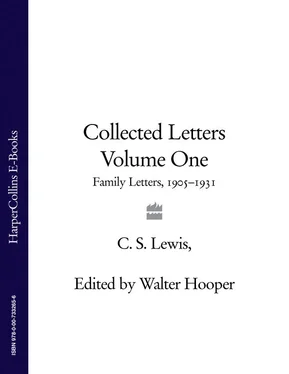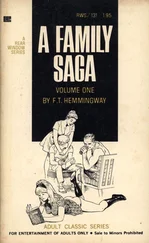By the way (all my sentences seem to begin like that) I am very sorry this is a bit late, but I was writing to my father and brother last night. Now, good night, Galahad, and be good and talk sense the next time you do me the honour of arguing with me.
Yours
Jack
P.S. What about the question of ‘sensulity’?
TO HIS FATHER (LP IV: 319-20):
[Gastons]
Friday [18 June 1915]
My dear Papy,
I am writing this immediately after reading your letter, but I mean it to belong to next week. Perhaps I shall not post it till Monday to equalize the dates, but at any rate it is much easier to write to you just after reading yours. I somehow seem to be unable to write to you properly now-a-days: perhaps because we make jokes nearly all the time when we are together, and household humour, though the funniest of all things to those who understand (a propos of which, read the first Roman story in ‘Puck of Pook’s Hill’), 65 can’t really be written down. Whereas if I try to be serious, I merely succeed in being ‘stuffy’. The last word describes exactly what I mean. However, as Plato says, the written word is only a poor faint shadow of real conversation, in which, among people who know each other well, the merest suggestion explains a train of thought which the most elaborate written explanation leaves obscure, lifeless and formal. 66 Still, as it would be expensive to telephone to you every week with trunk calls–do you remember the lady in ‘The Whip’? 67 –we must do the best we can.
I think we may reasonably hope that the war will be over before it begins to concern me personally. At the same time, the knowledge that I had gone as soon as possible to the front would not, I fancy, be a very substantial comfort to me if I arrived there as a conscript. All the people on whom that name has fallen would be lumped together without distinction in the minds of our Tommies–who indeed might be excused for feeling some warmth in the circumstances. Then there is the other possibility that Europe will be at peace before I am eighteen. In that case I believe my career at Oxford would be, if anything, a little easier than usual, owing to lack of competition. It would be ghastly however to reckon up that condition as an advantage–when we remember what it means. I am sorry for your sake that ‘Mr. Carr’ 68 has gone, but after all, from his point of view, it was inevitable. There is not much objection made to the teeth now, it seems!
I will certainly write to the Colonel as soon as you send me his address, which I am not quite sure of. I don’t think I will make it a birthday letter, which–from me at any rate–would not appeal to him: I may find some ‘crack’ however to interest him. Isn’t it interesting to note the different things we expect from different people? If I imitated your style exactly, and could write a letter to the Colonel almost the same as a typical one of yours, the result would be merely irritating: if you tried the same experiment with my style, or absence of style, the result would be the same. Yet both, I believe, would be acceptable from the right authors.
This is a digression: to go back to Warnie, it certainly must be very depressing to see so many of the Malvern lot–for whom he had a regard as genuine as it was inexplicable–dropping off like this. ‘It is an ill wind’–the proverb is rather old. But one result of the war to us seems to be that you and W., if I may say so, understand each other better than you have done for some time.
I am learning lots of things here besides the Classics–one of them being to take cold baths: and such an artist I am becoming that you will hardly know me when I get home for the brevity of my sojourn in the bath room and the prodigious amount of noise I make over it. The weather is still hot and a trifle oppressive here, but agreeable in the morning and evening.
I have been devoting this week to the reading of Othello, 69 which I like as well as any Shakesperian play I have read. The part of Iago, to my mind, is something of a blemish, and the fact that his pitiless malignity has absolutely no motive leaves him rather a monster (in the Classical, not the newspaper sense of the word), than a human character. But then of course Shakespeare at his best always works on titanic lines, and the vices and virtues of Lear, Macbeth, Hamlet, Othello, Desdemona, etc., are magnified to a pitch more splendid and terrible than anything in real life. 70
If I leave here on the 30th July, so as to arrive home on the last Saturday of that month, the exact half of the term ought to have fallen about four hours ago. That will make the usual twelve weeks. Only six more now! That sounds perhaps too like the old days at Malvern, but don’t suppose that because I will be glad to see you again, I am not happy and more than happy at the K’s.
your loving,
son,
Jack
TO ARTHUR GREEVES (W):
[Gastons
29 June 1915]
Dear Galahad,
Did the Norns or Dana holy mother of them that die not, weave for us in that hour wherein our mothers bare us, that never should we write to each other without the first page being occupied by argument? Because, whether by the decree of fate or no, this has always been the case. First it was Shee v. Souteraines, then Tears v. Trousers, and now Larne v. Leeborough–which by the way means Little Lea. How you can have known me so long without picking up the words & tags which I use every day passes my understanding–unless I am to conclude that you are asleep half the time I am talking to you, which is very probably so.
Well about this infernal holyday: as your infantile brain–for which I have catered on this envelope–is incapable of swallowing my previous very elementary argument, I will explain my position once more in very simple terms, as follows:–
I have eight weeks vacations.
I have been invited to stay 10 days with Mrs Hamilton. 71
I have accepted her invitation.
I intend to keep that promise
I don’t want to be any longer away than 10 days.
I don’t want to keep you at home on that account.
I therefore decline your kind proposal.
I am very sorry
I hope you understand. How’s that?
It may be true that it is easier to assign music to people we know, than to conjure up people to fit the music, but I deny that anyone’s character is really unlike their appearance. The physical appearance, to my mind, is the expression and result of the other thing–soul, ego, ψυχη, intellect–call it what you will. And this outward expression cannot really differ from the soul. If the correspondence between a soul & body is not obvious at first, then your conception either of that soul or that body must be wrong. Thus, I am ‘chubby’–to use your impertinent epithet, because I have a material side to me: because I like sleeping late, good food & clothes etc as well as sonnets & thunderstorms. The idealistic side of me must find an outlet somewhere, perhaps in my eye, my voice or anything else–you can judge better than I. And the other side of me exists in my countenance because it exists also in my character.
‘But’, I hear you saying, ‘this is all very well. Only what about the practised flirt with the innocent schoolgirl face & the murderer with a smile like an old woman?’ These are only seeming exceptions. The girl has or imagines she has that sort of disposition somewhere in her, or it wouldn’t be on her face: as a matter of fact, it is always ‘innocent’ (which means ignorant) people who do the most outrageous things. The murderer too, may be really a peaceful, kindly ‘crittur’, and if circumstances drive him to violence, the initial mould of the character and therefore of the face remain just the same.
I remember reading in a book called ‘The open Road’ 72 an extract from Hewlet’s ‘Pan and the Young Shepherd’ 73 which I thought splendid. Thanks to our Galahad’s detestable handwriting I can’t tell whether your book is the ‘Lore’ or the ‘Love’ of P. In any case I have never heard of it before, but, from your description, am very eager to read it. I also saw a copy of this author’s ‘Forest Lovers’ 74 in Carson’s last hols, but it did not attract me much. Is this new one in a decent edition?
Читать дальше












